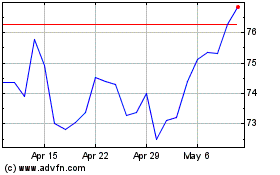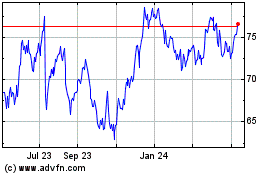New Research from State Street & IFSWF Reveals Asset Allocation Trends of Sovereign Wealth Funds, Focus on Private Market Cap...
December 22 2016 - 9:03AM
Business Wire
White Papers Unveil Trends in Short- and Long-term Investment
Strategies, and Trends Specific to Private Market Investing Among
Sovereign Wealth Funds
Two new white papers released today from State Street
Corporation (NYSE:STT) and the International Forum of Sovereign
Wealth Funds (IFSWF) reveal changes in asset allocation among
sovereign wealth funds (SWFs) over the past three to five years.
These shifts include a significant increase in allocations to
private markets (private equity, real estate and infrastructure)
and emerging markets, as well as a reduction in their exposure to
listed and developed-market investments. The research also looked
at SWFs’ motivations for entering private markets, the approaches
they had to develop to be successful, and lessons learned.
Earlier this year, State Street was appointed by the
International Forum of Sovereign Wealth Funds (IFSWF) as one of its
two official research partners for its Investment Practice
Committee, which has a year-round research program.
The first paper from that partnership, “Asset Allocation for the
Short and Long Term,” examines how SWFs are keeping up with the
post-crisis financial markets, and includes findings from a survey
of eight IFSWF members, representing a wide range of SWFs.
“Much like all investors in today’s economic climate, SWFs are
balancing traditional financial theory with the complexities
presented by today’s real-world circumstances,” said Will Kinlaw,
senior managing director and global head of State Street’s academic
affiliate, State Street Associates. “They recognize that, in many
cases, their long investment horizons represent an advantage, and
they are seeking investments that will provide attractive long-term
return, risk, and diversification properties. What looks appealing
based on monthly returns may look much less so when the horizon is
measured over multiple years.”
Key findings of the research include:
- None of the SWFs interviewed for the
research increased their allocation to foreign government bonds and
half had reduced their exposure to these securities;
- Half had increased their exposure to
emerging markets, with none reducing their exposure to these
geographies;
- As a group, these SWFs had
substantially expanded their alternative, unlisted, and private
investment portfolios. At least 30% of the surveyed group had
invested more, and none of the respondents had reduced their
exposure.
“One of the biggest findings from this research is the growing
focus on private markets,” continued Kinlaw. “Despite the allure of
these investments, SWFs are aware of the potential risks, with
illiquidity topping the list. However, many have invested
considerable time and resource in assessing these markets and have
clearly identified attractive opportunities here.”
Ten IFSWF members contributed to the second white paper,
“Comparison of Members’ Experiences Investing in Public versus
Private Markets,” which examines SWFs’ approach to investing in the
private markets.
Key findings include:
- SWFs often chose to enter private
markets as they believed that their long-dated liabilities mean
they can benefit from the illiquidity premium that these assets
offer. They also thought that private markets are less efficient
and, therefore, present more opportunities for return.
- Even though SWFs have been successful
in private markets, many reported ongoing internal debate as to
whether the return premium is fair compensation for the risks these
types of investments add to the portfolio.
- SWFs cited a wide range of factors that
led to success in private markets, including fostering a culture of
long-term investing, attracting and retaining qualified staff,
partnering with other SWFs, assigning multi-disciplinary due
diligence teams, and proceeding slowly to keep pace with developing
in-house capabilities.
- Of the SWFs interviewed for the paper,
50% said they had to make changes to their governance process to
overcome challenges related to the speed of decision-making
regarding private market opportunities.
The investment landscape has evolved significantly in recent
years, and SWFs have contended with an ever-expanding array of
investment opportunities in both public and private markets,” said
Roberto Marsella of CDP Equity (a company of the Cassa Depositi and
Prestiti group of Italy), lead of the Investment Practice Committee
of IFSWF. “In response, many are re-evaluating the methods they
employ to construct portfolios and measure and manage portfolio
risk. The low interest rate environment creates new challenges and
requires reassessment of investment methodologies and professional
skills.”
About State Street CorporationState Street Corporation
(NYSE: STT) is one of the world's leading providers of financial
services to institutional investors, including investment
servicing, investment management and investment research and
trading. With $29 trillion in assets under custody and
administration and $2 trillion* in assets under management as of
September 30, 2016, State Street operates in more than 100
geographic markets worldwide, including the US, Canada, Europe, the
Middle East and Asia. For more information, visit State Street’s
website at www.statestreet.com.* Assets under management include
the assets of the SPDR(R) Gold ETF (approximately $40 billion as of
September 30, 2016), for which State Street Global Markets, LLC, an
affiliate of SSGA, serves as the distribution agent.
About IFSWFThe International Forum of Sovereign Wealth
Funds (IFSWF) is a voluntary organisation of global sovereign
wealth funds committed to working together and strengthening the
community through dialogue, research and self-assessment.IFSWF was
formed in 2009 by a group of 23 leading state-owned international
investors from around the world. The Forum’s initial aim was to
maintain an open and stable investment climate by setting and
adhering to a set of Generally Accepted Principles and Practices,
known as the Santiago Principles, for sovereign wealth funds’
institutional governance and risk-management frameworks.Today,
helping members implement the Santiago Principles remains the
foundation of the IFSWF’s activity. But the Forum now represents a
group of more than 30 sovereign wealth funds from all corners of
the globe, with a variety of mandates and at various stages in
their development. As a result, the Forum’s focus has evolved. In
addition to encouraging ongoing commitment to the Santiago
Principles, the Forum also undertakes research, facilitates peer
assistance exercises and holds workshops and seminars to help
members enhance their existing investment capabilities. The IFSWF
also undertakes to represent its members to the global financial
and policy communities. For more information, visit
www.ifswf.org.
View source
version on businesswire.com: http://www.businesswire.com/news/home/20161222005389/en/
State Street CorporationLydia Cambata, + 44 203 395
7319LCambata@statestreet.com@StateStreet
State Street (NYSE:STT)
Historical Stock Chart
From Jun 2024 to Jul 2024

State Street (NYSE:STT)
Historical Stock Chart
From Jul 2023 to Jul 2024
